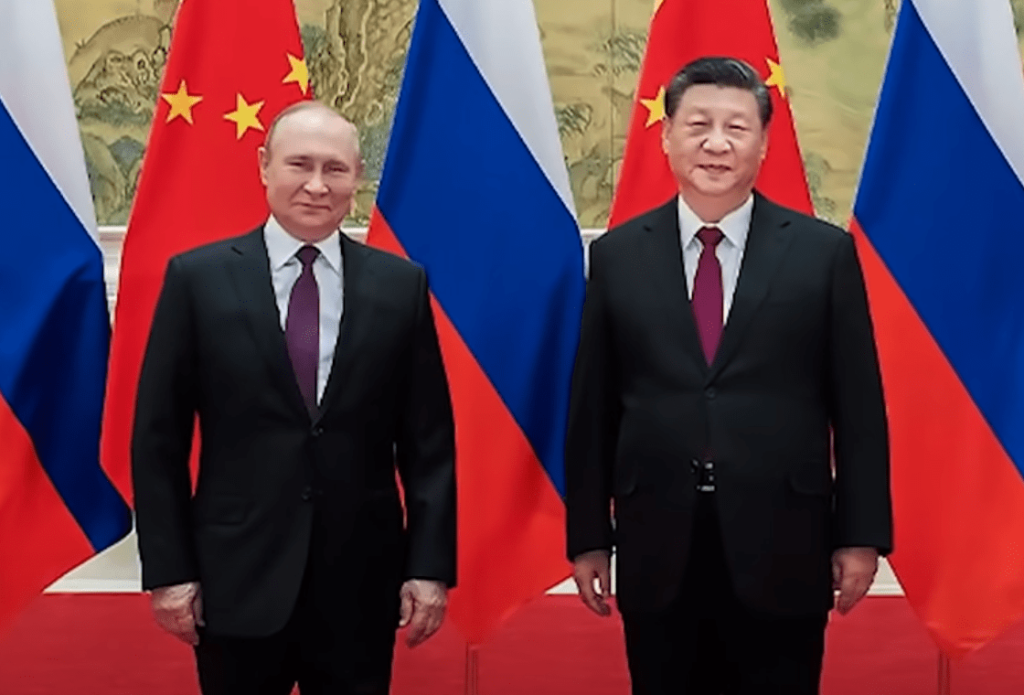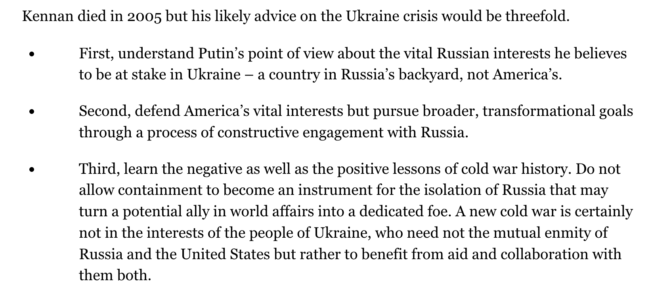Alas, The New World Order

I wish I had something hopeful to say about the situation between Russia and Ukraine. I ask nearly everyone I meet over here in Hungary, which borders Ukraine, what their take is, and the gloom is uniform, though not apocalyptic. Nobody wants this war, but few people — I haven’t met one, but maybe they exist — believe it can be avoided. The general view goes something like this:
1. Russia will invade Ukraine. At this point, it’s inevitable, and it’s going to produce bad things, including a likely refugee crisis for Hungary and other states that border Ukraine.
2. Russia will swiftly overwhelm Ukrainian forces.
3. Europe will do nothing, because Europe can do nothing. It is too militarily weak to intervene if it wanted to.
4. And most Europeans don’t want to, for four reasons.
a. Many of them recognize that Russia has a legitimate right to demand that Ukraine stay out of NATO.
b. Many of them recognize that the historical relationship between Ukraine and Russia is very complicated,
making it not the case that this is a simple, clean-cut matter of one nation invading another sovereign
nation.
c. Russia has a legitimate right to expect that Ukraine will stay out of NATO.
d. Europeans know that if they antagonize Russia, they will end up freezing during winters as the Russians
cut off gas, upon which many European nations are dependent.
5. The Europeans know they can’t count on America here.
When I hear some version of that last point, I chime in to say that they’re right, but that America has no business risking World War III with Russia over Ukraine. And then I explain how America has been at war for two decades now, draining ourselves in misguided wars in Iraq and Afghanistan. Americans can’t stand the thought of our old Cold War enemy Russia appearing to push us around, but deep down, there’s no stomach for war. And besides, who made us the sole arbiter of international relations? If Russia asserting its geostrategic interests on its own border amounts to pushing America around, then what kind of international order is it that lets the United States determine what other nations can and cannot do?
Remember the legendary Sovietologist and US diplomat George Kennan, who counseled realism in dealing with Russia, to protect America’s interests? Here’s an analysis speculating on what Kennan would say today, if he were alive:

Look, I don’t want Russia to invade Ukraine either, and am literally praying on and off throughout the day for peace. The Ukrainian people have had to suffer horribly at the hands of Moscow over the last century, and I don’t want them to suffer more. But this is the new world order we live in: a post-American world order, in which the United States is a diminished power on the world stage. One of my interlocutors this week pointed out that the French in particular don’t want this Ukraine war, and that the French tried to warn the US administration to stay out of Iraq back in the early 2000s. “Yes, and we hated them for it,” I replied. “But they were correct.”
It is so difficult for Americans to come to terms with the idea that we are no longer what we were. Many of us react to this Russia-Ukraine thing with jerking knees. Liberals can’t believe that we are going to allow the thuggish Putin to get away with brutalizing a sovereign country. Conservatives hearken back to Cold War simplicities, and rail against “defeatism”. Both sorts of hawks squawk “Munich!” as a way of closing off deliberation about the wisdom of risking war with Russia over Ukraine. Again, if you were around in the early 2000s and paying attention, this Munich thing showed up a lot in debates over the wisdom of going to war with Iraq. If you were against it, well then, you were nothing but a Yankee Neville Chamberlain. This is how the American people were talked into that stupid war of choice, or talked ourselves into it.
We Americans are not accustomed to not having our way on the world stage. This is not because we are somehow evil, or uniquely hegemonic; this is how great powers behave. We hide our own hegemonic impulses from ourselves by talking about our mission to spread freedom and democracy throughout the world (but only the kind of democracy in which the people vote in ways of which we approve; should the Hungarian people vote in this spring referendum to back their country’s LGBT media law, US officials will denounce the result), but the people around the world who are at the receiving end of our kind of freedom-and-democracy-promotion are less deluded by our pretenses.
Look at what the leadership class in the United States — in the government, in the military, in the political parties, in the universities and think tanks, and in the foreign policy and national security apparatus — did these past twenty years. We turned Iraq from a police state ruled by a vile anti-Iranian dictator into a puppet state of the Iranians. After spending between $1 trillion and $2 trillion dollars on the Afghanistan project, to say nothing of the human cost to dead and wounded American troops, the US left in humiliation last fall, with the Taliban back in power. Meanwhile, our own country is falling apart. We Americans are increasingly at each other’s throats. Income inequality has become much worse. Infrastructure is crumbling. Deaths by drug addiction and, more broadly, despair, are skyrocketing. Violent crime is way up. Our southern border is out of control. And on and on.
And now, the American people are supposed to follow the same leadership class that wrecked our prestige and power over the past two decades into a foolish and unnecessary showdown with a nuclear power over the fate of a country that is on the nuclear power’s own border, and that has historically been a part of that country for centuries? Really, we’re supposed to do that?
None of this, mind you, is to say that Russia is right to invade, or to threaten to invade, Ukraine. It is rather to say that I find it impossible to see what America’s vital interest is in risking war with Russia to try to prevent this from happening. It is not in America’s interest to rattle its saber in this part of the world. It is not 1992 anymore. Russia is stronger than she was then, and America is diminished, mostly by our own foolishness. On the Right, Pat Buchanan and Ron Paul warned us repeatedly over the years about the cost of interventionism, but we didn’t listen (and, as ever, I accuse myself of this prior to 2008 or so). Now we have to live with the consequences of the bad choices we made then, and no amount of blustering and wishful thinking can make things different.
Ask yourself: is this same leadership elite that is pushing progressivist racism and gender ideology at every level (including politicizing the military), waging culture war on a huge number of ordinary Americans whose damnable sin is to be white, male, heterosexual, and/or Christian, and presiding over the slow-motion ruin of our country really to be trusted in this new conflict? If in the unlikely event that we got into a shooting war with the Russians, who do you think is going to be on the front lines? Deplorables, mostly. Men (and maybe some women) for whom the emerging woke social and economic order does not work, but who are expected to salute the ruling class and prepare to risk their lives for … Ukraine.
(You might say: What about black American soldiers in Vietnam? They went to fight, even though parts of America were living under apartheid. Yes, they did go to fight, because as draftees, they had no choice. But had they been draft resisters, I say today that they would have been damn right to have demanded to know why they were being sent abroad to fight this war of choice on behalf of a ruling class that either oppressed them at home, or didn’t do enough to lift the yoke of injustice from their necks.)
This is a radical thing for a conservative like me to say, but the past two decades have radicalized me to a certain extent. In my book Live Not By Lies, I talk about how the Marxists never could really get a foothold in imperial Russia, until the Tsarist government’s bad handling of the 1891-92 famine revealed a degree of incompetence that shook the faith of many Russians in the system. For me, that has happened with the Iraq and Afghanistan wars, the 2008 financial crash, and now the establishment’s intellectual and moral collapse in the face of wokeness, in which the elites in every institution surrendered their beliefs in bedrock American values for the sake of … what, exactly?
Below are symbols of the American ruling class, the ones who are trying to rally us to stand against Russia in Ukraine. These are their sacred causes. This first tweet went out seven weeks after the international humiliation of the way we withdrew from Afghanistan:

And this infamous one, of course, went up less than three months before the last American soldier left Afghanistan, and the Taliban took over the government:

Do you believe that these people, our leadership class, know what they are doing? Do you believe they have the best interests of the American people at heart? Or are they so blinded by ideology that they keep leading us down blind alleys? At what point will the rest of us wake up and realize that these people do not know what they are talking about, and are going to keep hurting us?
Again, I do not want to see Russia invade Ukraine. I want diplomacy to solve this crisis. I believe the US meeting Russia’s legitimate demand that it abandon its insistence that Ukraine has a future in NATO is key to this, and should happen. Overall, though, I’m not all that interested in what’s best for Ukraine. I’m not all that interested in what’s best for Russia. I’m significantly more interested in what’s best for our European allies, but not nearly as interested as I am in what’s best for the United States of America. The choices we Americans have made over the past two decades, both in domestic and foreign policy, and in both public and private life, have rendered us weaker, and no amount of wishful nostalgia can erase that. We need to focus on rebuilding at home. We are not going to vote ourselves out of these multiple and varied crises, but it would help if we would at least replace the failed leadership we have now with political leaders who are willing to fight the manifold decadence endemic in our institutions, defend traditional American liberties, and stop trying to defend all the borders of its global imperium.
Over drinks this week, a Hungarian interlocutor who is sadly resigned to Russia’s invasion said, “From over here, it looks like you Americans have a huge number of problems at home. You are internally weak. It’s not as bad as western Europe, but it’s still pretty bad.” How could I argue with that? Could you? He wasn’t engaged in Magyar triumphalism — Hungarians seem to me to be well aware of their country’s challenges — but only pointing out that fewer and fewer foreigners look to America and see a model of what they want to be. This is a big change in my lifetime, but hey, we did it to ourselves, and are doing it to ourselves.
Subscribe for as little as $5/mo to start commenting on Rod’s blog.